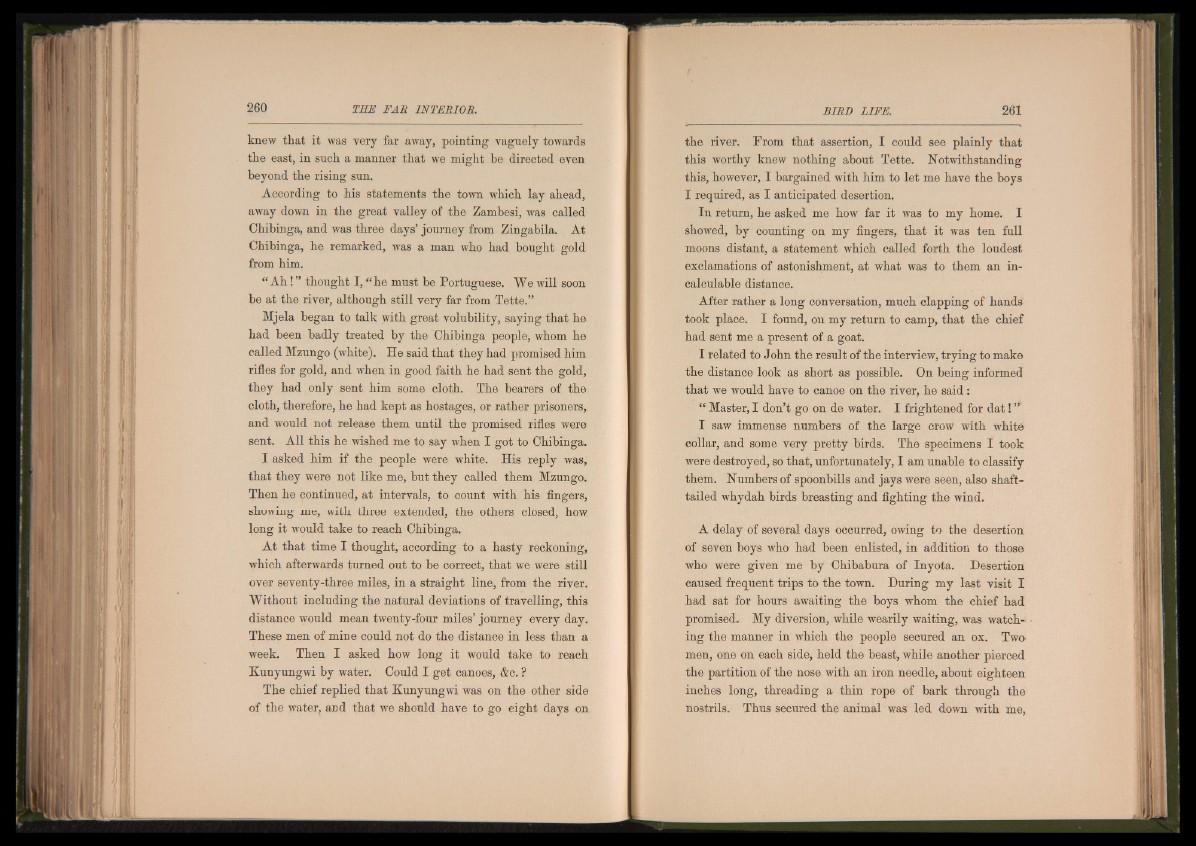
knew that it was very far away, pointing vaguely towards
the east, in such a manner that we might be directed even
beyond the rising sun.
According to his statements the town which lay ahead,
away down in the great valley of the Zambesi, was called
Chibinga, and was three days’ journey from Zingabila. At
Chibinga, he remarked, was a man who had bought gold
from him.
“ A h ! ” thought I, “ he must be Portuguese. We will soon
be at the river, although still very far from Tette.”
Mjela began to talk with great volubility, saying that he
had been badly treated by the Chibinga people, whom he
called Mzungo (white). He said that they had promised him
rifles for gold, and when in good faith he had sent the gold,
they had only sent him some cloth. The bearers of the
cloth, therefore, he had kept as hostages, or rather prisoners,
and would not release them until the promised rifles were
sent. All this he wished me to say when I got to Chibinga.
I asked him if the people were white. His reply was,
that they were not like me, but they called them Mzungo.
Then he continued, at intervals, to count with his fingers,
showing me, with three extended, the others closed, how
long it would take to reach Chibinga.
At that time I thought, according to a hasty reckoning,
which afterwards turned out to be correct, that we were still
over seventy-three miles, in a straight line, from the river.
Without including the natural deviations of travelling, this
distance would mean twenty-four miles’ journey every day.
These men of mine could not do the distance in less than a
week. Then I asked how long it would take to reach
Kunyungwi by water. Could I get canoes, &c. ?
The chief replied that Kunyungwi was on the other side
of the water, and that we should have to go eight days on
the river. From that assertion, I could see plainly that
this worthy knew nothing about Tette. Notwithstanding
this, however, I bargained with him to let me have the boys
I required, as I anticipated desertion.
In return, he asked me how far it was to my home. I
showed, by counting on my fingers, that it was ten full
moons distant, a statement which called forth the loudest
exclamations of astonishment, at what was to them an incalculable
distance.
After rather a long conversation, much clapping of hands
took place. I found, on my return to camp, that the chief
had sent me a present of a goat.
I related to John the result of the interview, trying to make
the distance look as short as possible. On being informed
that we would have to canoe on the river, he said:
“ Master, I don’t go on de water. I frightened for d a t! ”
I saw immense numbers of the large crow with white
collar, and some very pretty birds. The specimens I took
were destroyed, so that, unfortunately, I am unable to classify
them. Numbers of spoonbills and jays were seen, also shafttailed
whydah birds breasting and fighting the wind.
A delay of several days occurred, owing to the desertion
of seven boys who had been enlisted, in addition to those
who were given me by Chibabura of Inyota. Desertion
caused frequent trips to the town. During my last visit I
had sat for hours awaiting the boys whom the chief had
promised. My diversion, while wearily waiting, was watching
the manner in which the people secured an ox. Two-
men, one on each side, held the beast, while another pierced
the partition of the nose with an iron needle, about eighteen
inches long, threading a thin rope of bark through the
nostrils. Thus secured the animal was led down with me,